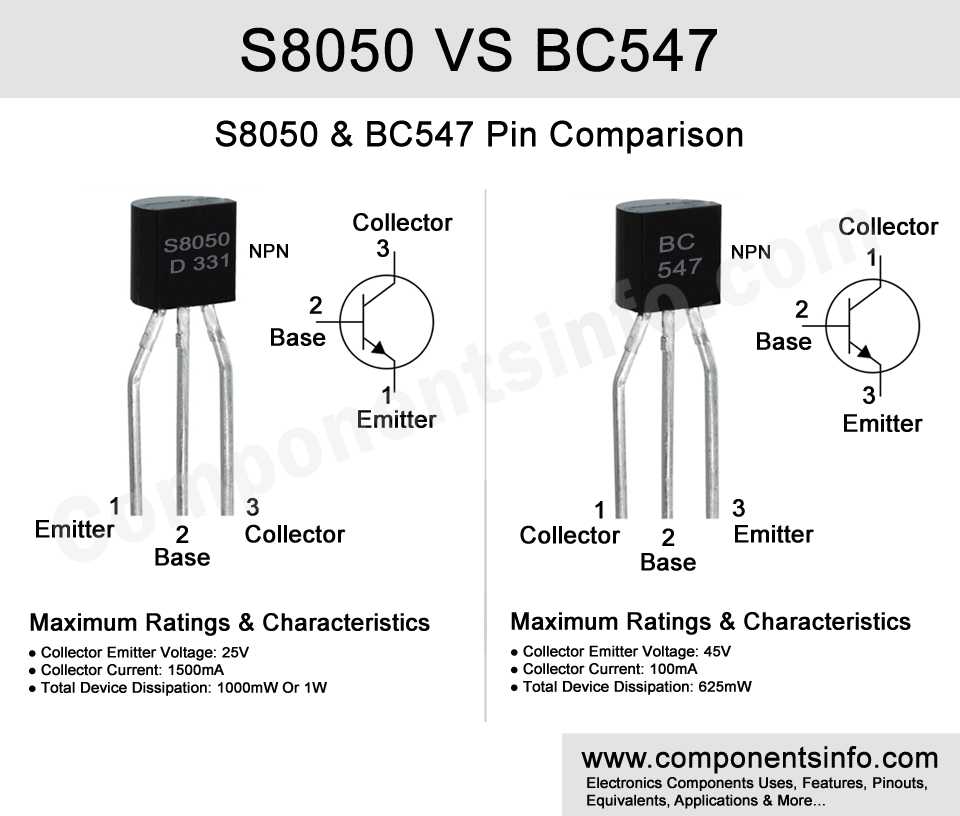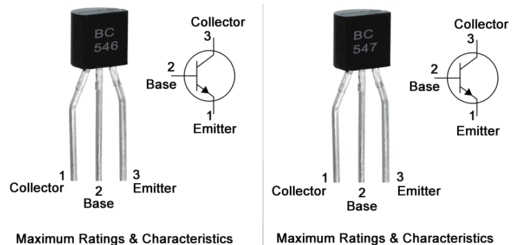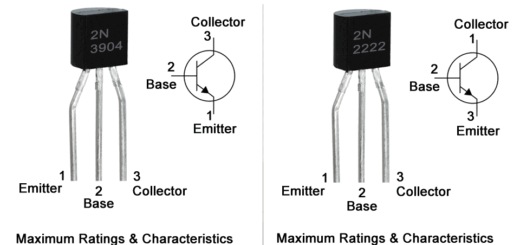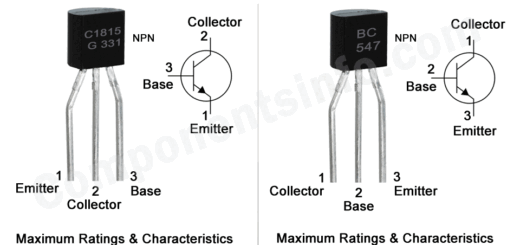S8050 VS BC547: What are the Differences and Similarities ?
If you are looking for S8050 VS BC547 transistor then you have come to the right place. Both of these transistors are NPN type and available in TO-92 package and are quite popular, reliable, and low cost and can easily be found in any electronic components store. This article contains information about the differences and similarities between these two transistors. Moreover, you will also find whether you can use them interchangeably and in what conditions you can interchange and in what conditions you cannot.
S8050 VS BC547 Pin Difference
When looking at the pin comparison chart of these transistors we can see that both have different pinouts. The S8050 transistor’s first pin is “Emitter” second is “Base” and third is “Collector” and the BC547 transistor’s first pin is “Collector”, second is “Base” and third is “Emitter”. Therefore when a replacement condition is match then you have to change the face of the transistor to opposite side.
Ratings & Characteristics Comparison:
| Ratings & Characteristics | S8050 | BC547 |
|---|---|---|
| Collector-Emitter Voltage (Vceo) | 25V | 45V |
| Collector Current (Ic) | 1500mA | 100mA |
| Total Device Dissipation (PD) | 1000mW | 625mW |
| DC Current Gain (hFE) | 85 To 300 | 110 To 800 |
| Frequency (fT) | 100 MHz | 300 MHz |
Can We Use BC547 Instead of S8050
As we can see in the ratings and characteristics chart above the collector to emitter voltage of S8050 is 25V, collector current is 1500mA, Total device dissipation is 1000mW, max DC current gain is 300 and transition frequency (fT) is 100MHz while the BC547’s collector to emitter voltage is 45V, collector current is 100mA, total device dissipation is 625mW, max DC current gain is 800 and transition frequency is 300MHz. So if you are using it in an amplifier circuit then there will be not much difference and you can use them interchangeably but if you want to use it as a switch then first you have to check the load voltage or how much voltage the load requires. If that voltage is under 20V (S8050 collector to emitter voltage is 25V but we cannot use a transistor to its absolute maximum ratings because this makes stress on the transistor) then you can easily replace it and more of the circuit in which these transistor are used are usually 12V or under 12V. But if BC547 is driving a load higher then 25V then you cannot replace it with S8050. Moreover the transition frequency of BC547 is 300MHz which is higher than the transition frequency of 100MHz due to which you cannot replace them in RF circuits which works above 100MHz.
Can We Use S8050 Instead of BC547
Again in this condition if the S8050 is used as an amplifier then there will not be much difference and you can use them interchangeably but when used as a switch then there is only one condition when you cannot use BC547 in place of S8050 when the load is above 80mA (Note: As you can see in the chart the BC547 collector current is 100mA but it is the absolute maximum rating of the transistor and we cannot use a transistor to its absolute maximum ratings because it makes stress on the transistor which may cause permanent damage of the transistor or weak its performance. Therefore we have to use it atleast 20% below from its absolute maximum ratings.) because the BC547 transistor cannot drive load of more than 80mA so in this condition we cannot use BC547 in place of S8050 and we have to find some other alternatives.
Conclusion
So now it is clear that we can interchange them when they are used as an amplifier but when it comes to using them as a switch there are some conditions in which we cannot use them interchangeably. The S8050 collector to emitter voltage is 25V so it cannot be used in the place of BC547 when the load requires more than 25V and the other condition is when it is used in a RF circuit above 100MHz. And when you want to replace BC547 in place of S8050 it cannot be replaced only in one condition when the load requires higher current than 80mA. Rather than that you can use BC547 in place of S8050 in all conditions.



